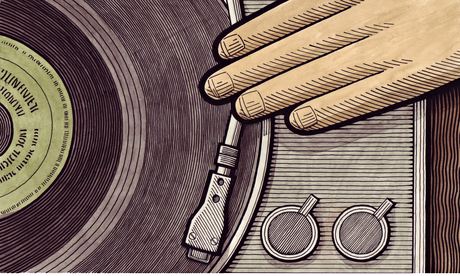
Some years ago, a kindly editor asked me to review the latest novel by the celebrated American writer Richard Powers. Having attempted the first 30 or so pages numerous times, I eventually gave up and pleaded that I found the thing literally unreadable. But either Powers has mellowed since then or I have got a bit better at reading, because I had no difficulty in finishing Orfeo, and had quite some pleasure along the way.
Our protagonist is Peter Els, a 70-year- old composer, of some obscure renown among the cognoscenti. One day before the events of the novel's present-day timeline unfold, he reads about the DIY biology movement – people tinkering with DNA in their garages – and orders the appropriate equipment himself from the internet. Unfortunately, when the cops turn up for an unrelated reason, they become very suspicious on seeing Els's lifehacking toys. Then something happens and Els becomes a wanted man, a bioterrorist on the run.
The publishers' blurb plays up this aspect of the narrative – "a story of one man running for his life" etc – though it is largely just a framing device. Perhaps understandably, they don't want to sell the book as what it really is: a novel about music. Worse than that: a novel about "classical" or art music. Mahler, Messiaen and so forth. Much better to emphasise the wanted-man angle.
Most of the novel is in flashback, and takes us through the hero's life so far: Els as a child who falls in love with Mozart's Jupiter symphony and hears only "harmonic jail" in rock'n'roll; Els as an undergraduate student in chemistry, taking a music course on the side (the DNA-hacking and the music strands of the narrative will finally be shown, with a rather lovely and eerie idea, to be twisted together); Els as a graduate student, marrying his muse, a singer named Maddy; Els leaving his wife and young daughter to compose music for crazy New York hippy art-happenings organised by his madcap impresario friend Richard; then Els as a solitary forest-cabin burnout case, writing music for no one; and Els semi-triumphant with a controversial public work.
As a young composer, Els is considered a nostalgic throwback by his most avant-garde colleagues, but he ends up somewhat vindicated in his conviction – shared with his real-life contemporary, the American composer John Adams – that the 20th century's experiment in the complete abandonment of tonality was a dead end. Powers lends Els's biography rich scenes of flirtation, friendship and artistic silliness, and a lot of pleasantly dry humour – references to "morbid Eurotrash productions of Mozart with underwater nudity"; or a wealthy patron impressed by "that gooseflesh feel of shared doom she looked for in art".
Powers has not wholly solved the problem of writing about music without resort to technical language. To be fair, it is probably insoluble. The novel's evocations of musical pleasure will work best for readers who understand what, for example, suspensions or "strident minor sixths" are; but a lot of the musical description accomplishes impressively imagistic things with the most familiar possible terminology: names of instruments, "crescendo", the kinds of spatial metaphor with which music is always already riddled. ("The sopranos chase each other up a cosmic staircase, driven higher by the lurching vibraphones.") Cleverly, Powers makes sure to use as many vocal analogies as possible, since everybody knows what the human voice does: its verbs are as familiar to Lady Gaga fans as to creators of squeaky-door opera.
The most dramatic passages in the novel, indeed, have nothing to do with the older Els dodging the Feds. Instead, they portray nothing more apparently exciting than the composer listening to a famous piece of music (Shostakovich, Steve Reich) while sitting in a cafe or driving his car. These are exquisite set pieces of ekphrasis: the description of a work of art within another work of art.
A possible faint dissonance or false relation here lies in the fact that, though we are told several times that Els's motto is "Music doesn't mean things. It is things", the novel's long descriptions of single pieces of music do occasionally descend to ascribing mere meaning to the play of sound and time. It might have been bracing to read such passages purged of all terms implying emotional diagnosis – "hopeful", "bliss" and so forth. Powers is of course aware of the problem, and has Els think through it. It is "the problem with music", our hero decides. "Even the slightest tune sounded like a story. Melody played on the brain like a weather report, an avowal of faith, gossip, a manifesto. The tale came across, clearer than words. But there was no tale."
Very often, this novel makes you want to scurry to CD player or iPod to listen along. In that infectious enthusiasm, Orfeo is the equivalent in fiction of Alex Ross's history of 20th-century music, The Rest Is Noise. But whereas Ross's book fades out in the fragmentary soundscape of our day, Powers supplies a galloping finale that is sweet, funny, sad and haunting all at once, and comes to a halt on the edge of a precipice. The rest is silence.
Earlier, the older Els has gone to see a neurologist because the way he hears music has changed. The happily named Dr L'Heureux asks him whether he is having any trouble finding the right words. "Els," the novel replies ruefully to itself, "had never in his whole life been able to find the right words." Luckily, in this formidably intelligent and ecstatically noisy novel, Powers almost always can.

